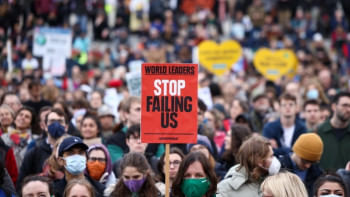Can we be eight billion strong?

As we know by now, the world population reached the eight-billion mark on November 15, 2022. But this milestone, quite understandably, has been met with mixed feelings. The unprecedented growth has been attributed to a longer average lifespan, better and more accessible healthcare and nutrition, and high fertility rates in some countries. While this is the highest number of humans to have ever existed simultaneously on Planet Earth, it is also true that, after the peak in the early 1960s, the population growth rate decelerated significantly; it currently stands at less than one percent per year. The UN projects that world population will peak at 10.4 billion in the 2080s, and remain largely stagnant around that number till 2100.
But as the UN secretary-general has rightly put it: "... as our human family grows larger, it is also growing more divided." With the climate crisis intensifying, the fallout of a war in Europe spilling all over, and middle- and low-income countries struggling in their fight to recover from pandemic-induced effects, this division is becoming more and more unmanageable.
One persistent challenge that humanity faces is inequality, with the top one percent claiming one-fifth of the world's income, and also controlling distribution and utilisation of this wealth. Meanwhile, poorer countries continue to disproportionately suffer the impacts of wealth inequalities and the climate crisis, while developed countries, far from taking responsibility for their contribution to sustaining these vulnerabilities, continue to pursue fossil fuels, deforestation, resource-hoarding, etc. As experts have pointed out, it may seem like eight billion is too high a number of humans which will push the natural limits of the planet, but the real problem is the overconsumption of existing resources by a select group of people, corporations, and countries.
On top of this, reports from the ongoing COP27 climate change summit have revealed how developed nations such as the US, the UK, and those in the EU are banding together against efforts to establish a new loss and damage fund to help vulnerable countries recover from climate disasters. According to the Thomson Reuters Foundation, in 2021, climate disasters caused USD 30 billion in damages in developing countries. The current size of the global humanitarian aid is not enough to make up for losses suffered in climate disasters, which are growing in frequency and intensity.
There is a clear need to impose accountability on the developed countries when it comes to helping vulnerable communities in the developing countries, whose lives and livelihoods continue to be at the mercy of climate change and other man-made risk factors. They must take responsibility. We join our voices with the protesters at COP27 and beyond, who are demanding that those largely responsible for climate disasters be made to "pay up" for the resultant losses and damages. Otherwise, the rising global population will only mean rising suffering.

 For all latest news, follow The Daily Star's Google News channel.
For all latest news, follow The Daily Star's Google News channel. 





Comments